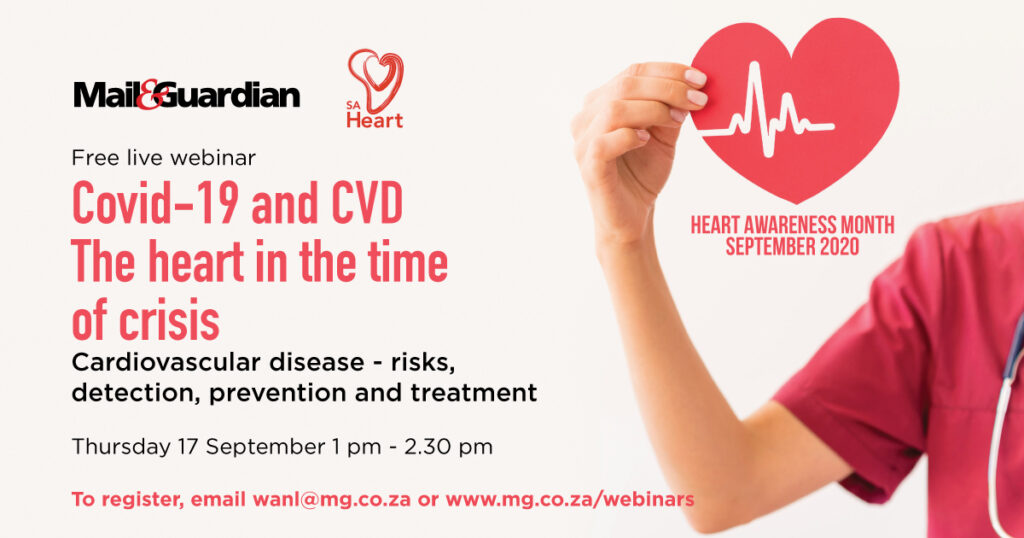Dr Blanche Cupido is President-Elect of The South African Heart Association
This Mail & Guardian webinar on Covid-19 and CVD was sponsored by the South African Heart Association (SA Heart). Speakers included Dr David Jankelow, Cardiologist at Netcare Linksfield Clinics and President of SA Heart; Dr Blanche Cupido, President-Elect of SA Heart and Consultant Adult Interventional Cardiologist and Professor Liesl Zühlke, a Paediatric Cardiologist in the Department of Paediatric Cardiology at Red Cross Children’s Hospital. The webinar was moderated by Marcelle Gordon, an Anchor on TV news channel eNCA.
Prevention is always better than cure, so looking after your health is key for both heart conditions and recovery from Covid-19. Finding effective ways to get this message across is a constant concern for those who work for SA Heart, and the issue cropped up repeatedly during the discussion. On the up side, there has been an amazing amount of collaboration among medical professionals during the pandemic; but it has also caused massive loss and heartbreak.
About 225 people die each day in SA from cardiovascular disease (CVD), which is the world’s biggest killer. Many patients with CVD were afraid of contracting the virus, so they were ignoring their symptoms and not coming in for check-ups and, despite calls to do so.
 Dr David Jankelow is a Cardiologist at Netcare Linksfield Clinics and President of The South African Heart Association
Dr David Jankelow is a Cardiologist at Netcare Linksfield Clinics and President of The South African Heart AssociationOver 100 people tuned into the webinar, including those with various cardiovascular conditions and those who treat them. A poll was conducted to see if anyone with cardiovascular disease (CVD) avoided going for check-ups or collecting medication because of Covid-19; only 14% indicated “never”, but over 30% said “sometimes”.
Dr David Jankelow said there has been a lot of teamwork and camaraderie among his colleagues at Netcare, in their dealing with Covid-19. “I’ve never experienced anything like this,” he said about the pandemic, describing the period as “a blur”. He said there has also been a lot of fruitful correspondence with those researching Covid-19 overseas.
Dr Blanche Cupido said that there is an some overlap of cardiac and Covid-19 symptoms, such as shortness of breath, palpitations and chest pain, so this was very anxiety-provoking for cardiac patients: do I have Covid-19, or are these just my usual symptoms? However, “the vast majority of those with Covid-19 won’t have heart palpitations”, according to Jankelow.
Professor Liesl Zühlke said working in a paediatric situation means that all decisions made about patients involve their families. Public health and family economies have affected the children enormously. She said the way the staff were looked after was a whole issue on its own, and that PIMS (Paediatric Multisystem Inflammatory Syndrome) was another big concern.
An emergency meeting was called about two months ago with the minister of health to develop a position statement regarding CVD and Covid-19. SA Heart welcomed the engagement with the health department, especially in the light of the advent of NHI, said Jankelow, who described Covid-19 as the new “great mimicker” — its symptoms can easily be confused with those of other diseases or conditions.
 Professor Liesl Zühlke is a paediatric cardiologist in the Department of Paediatric Cardiology at the Red Cross Children’s Hospital
Professor Liesl Zühlke is a paediatric cardiologist in the Department of Paediatric Cardiology at the Red Cross Children’s HospitalCupido echoed this, saying that there has been a lot of difficulty regarding diagnosis, and then how to deal with the people around the person diagnosed, as concerns such as poverty and housing then came into play. There was also a shortage of staff, as many frontline workers caught Covid-19 themselves. A lot of new issues cropped up, so the staff had to be very adaptable and “roll with the punches”.
The pandemic has generated an immense amount of data, and this had to be assessed and validated continually. “It was a time of great humility” admitted Zühlke, as tactics had to be changed if they weren’t working. She said they lost two great stalwarts in their field, Professors Solly Levin and Lungile Pepeta, which impacted them all deeply, and brought them “face to face with their own mortality”. New ways to work with nurses and volunteer staff had to be formulated, and how to test them.
There was much heartbreak, as relatives could not visit sick loved ones, and this was compounded if family members had emigrated. PPE had to be worn, which was very uncomfortable; the “real heroes” were the nurses who had to wear it for six hours at a time, said Jankelow.
Cupido said the usual processes of treatment were stuck to, with added Covid-19 precautions, for those presenting with CVD symptoms. Zühlke said children with comorbidities were most affected by Covid-19. This was also an issue for pregnant women; both women and children are vulnerable populations and harder to treat.
She talked about the “Covid bulge” — many people ate too much and did not exercise enough during the lockdown, which makes them more susceptible to CVD and Covid-19. This is something she wanted to emphasise during Heart Month.
Jankelow, who is about to turn 60, is a CrossFit fan and now has to do 60 burpees as part of the course. He said prevention is better than cure, but that up to 50% of Africans don’t even do light exercise or go for regular check-ups. If you are middle-aged, it may be best to consult your physician if you are starting an exercise regime, he advised.
 Marcelle Gordon, Anchor on TV news channel eNCA
Marcelle Gordon, Anchor on TV news channel eNCAOn the issue of health, many South Africans cannot afford healthy food and some don’t have time for exercise, but Cupido said many people don’t want to take responsibility for their health and blame risk factors beyond their control. Repeated messaging does make a difference; she tries to set realistic, simple goals for her own patients, and help them own their issues and actions.
Zühlke said that children are agents of change, able to change the behaviour of the entire family. Maintaining your teeth can help lessen certain heart conditions, so strong messages are being sent out regarding sugar and fizzy drinks. Social media is an effective way of getting health messages across, but not everybody has access to data. Community radio is “incredibly useful” for getting health messages out, she said; other things like wearing red on Heart Day help.
Masks may be uncomfortable, but wearing them is very important to prevent the spread of the virus. Only very young children can be excluded. It’s very important for people with heart conditions to wear masks, even if they are not comfortable, and even though the lockdown levels have dropped; masks don’t decrease the level of oxygen, so heart patients should continue to wear them.
Does Covid-19 affect your heart? A recent test showed that those who had the virus have had some kind of affect on their hearts, so it’s best if you have had it to begin exercise very gently. The long-term effects are not known.
There is some evidence that anticoagulants help if you have Covid-19, but if you are on anticoagulants already, it won’t prevent you from getting the virus. Patients should not alter their medication if they catch Covid-19. Early diagnosis is always best to decrease long-term effects of CVD, so scanning for symptoms before and just after birth is recommended. “Raising the flag of awareness is absolutely crucial” said Zühlke — men and women have different symptoms for the onset of heart attacks, for instance — and early detection is crucial for PIMS.
Children with heart conditions often neglect their healthcare when they become adults, but this care should be maintained to prevent gaps, and a lot of work needs to be done in this area. Those most at risk of CVD are the people who are overweight, diabetic and hypertense, and this group is also most at risk of dying from Covid-19.
Jankelow said the biggest plus from the pandemic was the collaboration among experts. We must build on what we know, said Cupido, and work out what functioned most efficiently. She advised those who take medication to be proactive and keep a two-week supply handy. Zühlke said that data has determined policy; that those who have helped others in this time deserve recognition; and that we must all actively maintain our health; “health is not just taking a pill when we get sick”.
To listen to the webinar, visit: https://event.webinarjam.com/replay/400/oy764s33s1zt8rsv0mm

September is Heart Awareness Month – an entire month dedicated to raising awareness about cardiovascular disease in South Africa, culminating with World Heart Day on September 29. For more information on CVD visit: https://www.saheart.org/